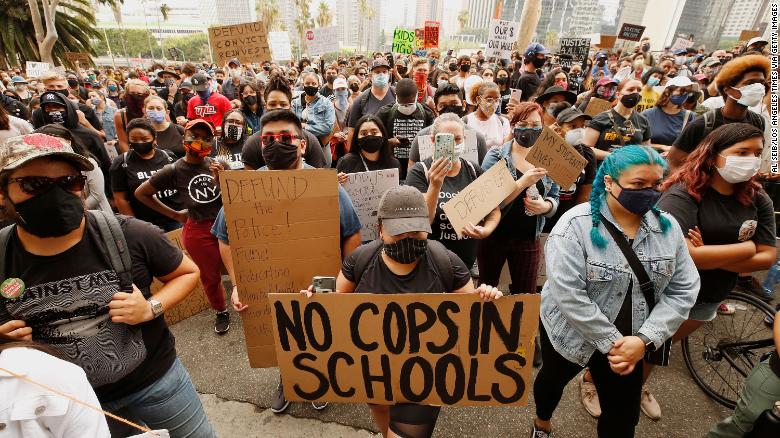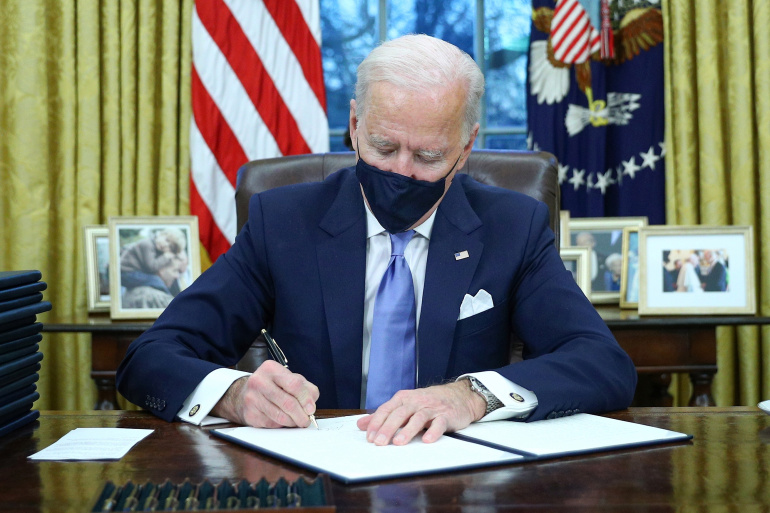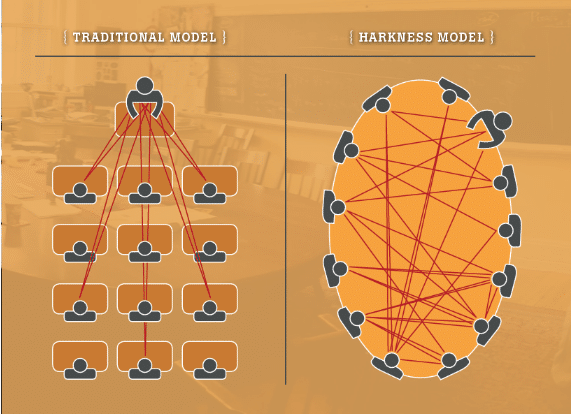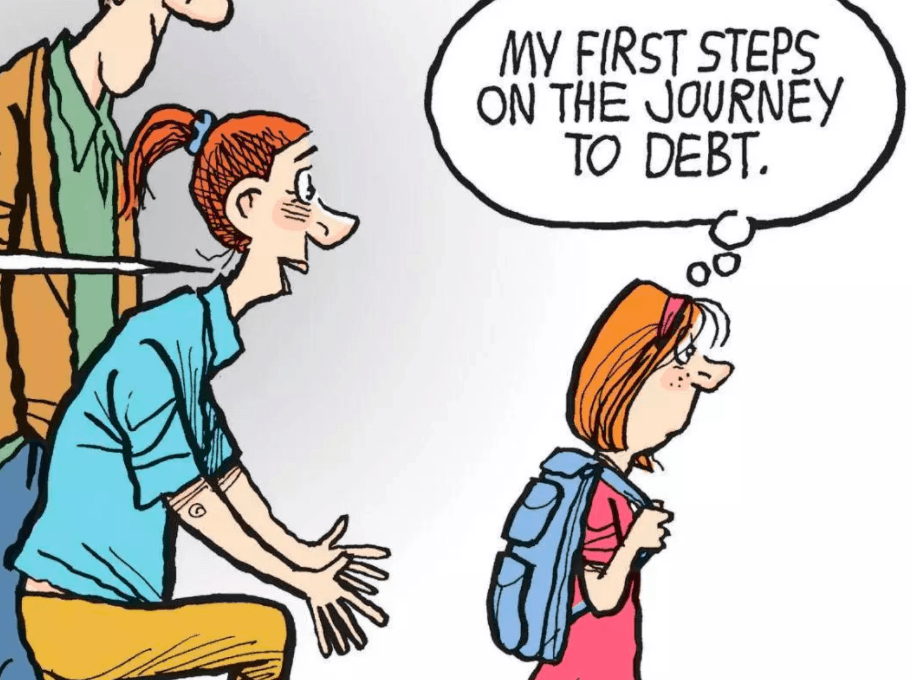Found 49 Results
Page 6 of 7

The Debate Over School Resource Officers and the #CounselorsNotCops Campaign
Post | February 16, 2021
The debates over defunding or reforming the police and addressing the school-to-prison pipeline have merged to focus on the issue of police officers in schools. School resource officers (SROs) are career law enforcement officers who work in one or more schools.1 According to the Department of Justice, SROs are “responsible for safety and crime prevention […]

- Civil Rights & Individual Liberties
- COVID-19
- Economic Issues
- Education
- Energy & Environment
- Executive Branch
- Foreign Policy
- Government & Elections
- Health Care
- Immigration
- Legislative Branch
- Partisanship & Polarization
President Biden’s Policy Priorities: The First 100 Days
Post | January 22, 2021
During his inaugural address, President Joe Biden laid out a number of policy priorities. The clearest theme of his speech was a call for unity and the need to address political divisions in the United States, which came to a head with the attack on the Capitol on January 6, 2021.1 However, President Biden also […]

Summer Round-Up #1: The Pandemic, Schools, and The Economy
Post | August 26, 2020
The summer of 2020 has been unlike any other. Schools across the country did not finish the end of the academic year in person, and many will not be seeing students in person once again this fall. Major events have been canceled or moved online, and we are in the midst of a presidential election […]

Discussing Race & Racism with Students
Post | June 2, 2020
Over the past week, we have witnessed an outpouring of grief and rage that reminds us—again—that democracy is always in the making and that we have a responsibility both to reflect and to act. As civic educators, we naturally turn our attention to what we can do, and what we can teach, that might further […]

The Supreme Court Will Address DACA. What Will Follow?
Post | October 30, 2019
On November 12, 2019, the Supreme Court will hear arguments about the Trump administration’s efforts to end the immigration policy known as Deferred Action for Childhood Arrivals (DACA). The status of DACA recipients has been in limbo for over two years amidst administration actions and court injunctions. What Is DACA? After Congress failed in its […]

Using the Harkness Method to Teach the News
Post | October 24, 2019
A Brief Introduction to The Harkness Method1 The Harkness method is a type of student discussion created at the Phillips Exeter Academy in 1930. At the time, most methods of education involved teacher-led lectures and rote memorization. But a wealthy philanthropist, Edward Harkness, promised a financial contribution of over $5 million (or almost $90 million […]

Should Public College Be Free?
Post | April 23, 2019
College has not only gotten expensive, but the cost becomes a burden for years. When graduating an undergraduate program, the average student leaves with over $37,000 in student loan debt. This is a $20,000 increase from 20 years ago. Over 70% of students today graduate with a significant amount of loans with an average of […]

Should the US designate an official language?
Post | March 26, 2019
The United States is one of a few nations in the world to have no official language designated. While the Constitution gives no reason for this, many reasons have been suggested by experts. Several bills have been introduced in Congress to designate English as the national language in the United States, but none have ever […]
Page 6 of 7
Page 6 of 7

The Debate Over School Resource Officers and the #CounselorsNotCops Campaign
Post | February 16, 2021
The debates over defunding or reforming the police and addressing the school-to-prison pipeline have merged to focus on the issue of police officers in schools. School resource officers (SROs) are career law enforcement officers who work in one or more schools.1 According to the Department of Justice, SROs are “responsible for safety and crime prevention […]

- Civil Rights & Individual Liberties
- COVID-19
- Economic Issues
- Education
- Energy & Environment
- Executive Branch
- Foreign Policy
- Government & Elections
- Health Care
- Immigration
- Legislative Branch
- Partisanship & Polarization
President Biden’s Policy Priorities: The First 100 Days
Post | January 22, 2021
During his inaugural address, President Joe Biden laid out a number of policy priorities. The clearest theme of his speech was a call for unity and the need to address political divisions in the United States, which came to a head with the attack on the Capitol on January 6, 2021.1 However, President Biden also […]

Summer Round-Up #1: The Pandemic, Schools, and The Economy
Post | August 26, 2020
The summer of 2020 has been unlike any other. Schools across the country did not finish the end of the academic year in person, and many will not be seeing students in person once again this fall. Major events have been canceled or moved online, and we are in the midst of a presidential election […]

Discussing Race & Racism with Students
Post | June 2, 2020
Over the past week, we have witnessed an outpouring of grief and rage that reminds us—again—that democracy is always in the making and that we have a responsibility both to reflect and to act. As civic educators, we naturally turn our attention to what we can do, and what we can teach, that might further […]

The Supreme Court Will Address DACA. What Will Follow?
Post | October 30, 2019
On November 12, 2019, the Supreme Court will hear arguments about the Trump administration’s efforts to end the immigration policy known as Deferred Action for Childhood Arrivals (DACA). The status of DACA recipients has been in limbo for over two years amidst administration actions and court injunctions. What Is DACA? After Congress failed in its […]

Using the Harkness Method to Teach the News
Post | October 24, 2019
A Brief Introduction to The Harkness Method1 The Harkness method is a type of student discussion created at the Phillips Exeter Academy in 1930. At the time, most methods of education involved teacher-led lectures and rote memorization. But a wealthy philanthropist, Edward Harkness, promised a financial contribution of over $5 million (or almost $90 million […]

Should Public College Be Free?
Post | April 23, 2019
College has not only gotten expensive, but the cost becomes a burden for years. When graduating an undergraduate program, the average student leaves with over $37,000 in student loan debt. This is a $20,000 increase from 20 years ago. Over 70% of students today graduate with a significant amount of loans with an average of […]

Should the US designate an official language?
Post | March 26, 2019
The United States is one of a few nations in the world to have no official language designated. While the Constitution gives no reason for this, many reasons have been suggested by experts. Several bills have been introduced in Congress to designate English as the national language in the United States, but none have ever […]
Page 6 of 7







